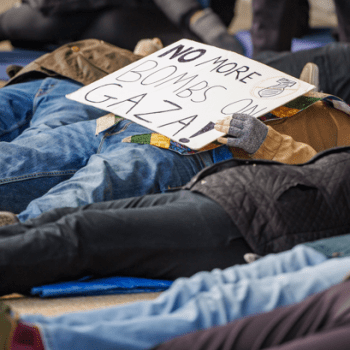Every other summer, my family goes to visit my wife’s cousin on his ranch in Bastrop, Texas. He has a huge collection of Henri Nouwen books. This summer, I borrowed Here and Now: Living in the Spirit. I’ve been flipping through it the last few months. For some reason, last night I read a section I’d already read multiple times and it hit me powerfully. So I wanted to share some quotes from it with my reflections.
We must learn to live each day, each hour, yes, each minute as a new beginning, as a unique opportunity to make everything new. Imagine that we could live each moment as a moment pregnant with new life. Imagine that we could live each day as a day full of promises. Imagine that we could walk through the new year always listening to a voice saying to us: “I have a gift for you and can’t wait for you to see it!”
This is the kind of writing that first enchanted me when I read Nouwen’s Life of the Beloved. The ability to live each moment as a new beginning is the gift we receive from Jesus’ cross and resurrection. We are constantly being redeemed, restored, and renewed. I believe this way of living in continual renewal and imagination is what it means to have eternal life.
It is hard to live in the present. The past and the future keep harassing us. The past with guilt, the future with worries. So many things have happened in our lives about which we feel uneasy, regretful, angry, confused, or, at least, ambivalent. And all these feelings are often colored by guilt. Guilt that says: “You ought to have done something other than what you did; you ought to have said something other than what you said.” These “oughts” keep us feeling guilty about the past and prevent us from being fully present to the moment. Worse, however, than our guilt are our worries. Our worries fill our lives with “What ifs”: “What if I lose my job, what if my father does, what if there is not enough money, what if the economy goes down, what if a war breaks out?” These many “ifs” can so fill our mind that we become blind to the flowers in the garden and the smiling children on the streets, or deaf to the grateful voice of a friend.
The “oughts” and “ifs” are our greatest enemies. In the recovery community, we talk a lot about the things that bring us resentment, guilt, and anxiety. Those are the things that throw us into harmful addictive behaviors. It may sound simple but a primary goal of spiritual discipline is simply to learn how to live in the here and now.
Prayer is the discipline of the moment. When we pray, we enter into the presence of God whose name is God-with-us. To pray is to listen attentively to the One who addresses us here and now. When we dare to trust that we are never alone but that God is always with us, always cares for us, and always speaks to us, then we can gradually detach ourselves from the voices that make us guilty or anxious and thus allow ourselves to dwell in the present moment.
This blew my mind even though it’s so obvious. Prayer is the way to be the most present to the moment. To be in God’s presence is to be fully present. They are the same thing. Now some of my friends in recovery would say they call their higher power “the universe.” That’s fine if you’re able to experience the universe as a presence that is constantly embracing you and declaring your belovedness.
Listening to the voice of love requires that we direct our minds and hearts toward that voice with all our attention. How can we do that? The most fruitful way — in my experience — is to take a simple prayer, a sentence or a word, and slowly repeat it. We can use the Lord’s prayer, the Jesus Prayer, the name of Jesus, or any word that reminds us of God’s love and put it in the center of our inner room, like a candle in a dark space… This is not always a satisfying experience. Often we are so restless and so unable to find inner quietude that we can’t wait to get busy again…Still, when we remain faithful to our discipline, even if it is only ten minutes a day, we gradually come to see–by the candlelight of our prayers–that there is a space within us where God dwells and where we are invited to dwell with God.
This gave me chills, because it narrates exactly how I discovered contemplative prayer. When I first read Nouwen’s Life of the Beloved, my life was a complete trainwreck. But every night, I would take a candle, put it in the center of room, and say over and over again, “Lord, please clear a space for yourself in my heart.” I said it hundreds of times. And nothing changed. Until everything had. And I realized that God had answered my most desperate prayer. I really believe that saying prayers as mantras is very powerful. The Orthodox say the Jesus Prayer thousands of times a day. Because they understand that prayer is formational rather than transactional. It’s like digging a hole with your shoe. It takes forever, but if you’re patient and persistent, you will eventually have a very deep hole.
We often wonder what we can do for others, especially for those in great need. It is not a sign of powerlessness when we say: “We must pray for one another.” To pray for one another is, first of all, to acknowledge, in the presence of God, that we belong to each other as children of the same God. Without this acknowledgment of human solidarity, what we do for one another does not flow from who we truly are. We are brothers and sisters, not competitors or rivals. We are children of one God, not partisans of different gods. To pray, that is, to listen to the voice of the One who calls us the “beloved,” is to learn that that voice excludes no one. Where I dwell, God dwells with me and where God dwells with me I find all my sisters and brothers. And so intimacy with God and solidarity with all people are two aspects of dwelling in the present moment that can never be separated.
Our relationship with God and our relationships with each other are inseparable. It is tremendously important for whatever I do for other people to come from the right place. If I am not grounded in my belovedness through prayer, then it’s easy for my good deeds to become a substitute for my unconditional acceptance. If I’m trying to earn acceptance through my good deeds, all sorts of ugliness will come from that. If instead, I gain the insight that intimacy with God and solidarity with all people are mutually interdependent, then my actions can truly take the form of love.
Check out my book How Jesus Saves the World From Us!
Become a monthly patron of our ministry NOLA Wesley!

















